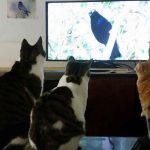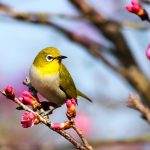I was under the impression that bird banding or ringing was universally appreciated as a valuable instrument in the ornithological arsenal. Apparently, not everyone agrees. Help clarify this issue… is there widespread controversy around banding or simply slight opposition?
Recent Posts
 Interviews with 10,000 Birds Writers: Faraaz Abdool, Trinidad&TobagoBy Editor
Interviews with 10,000 Birds Writers: Faraaz Abdool, Trinidad&TobagoBy Editor Demotivational Posters for Birds (XI)By Kai Pflug
Demotivational Posters for Birds (XI)By Kai Pflug 5 Reasons To Love Cats And BirdsBy Kai Pflug
5 Reasons To Love Cats And BirdsBy Kai Pflug Cooper’s Hawk: A fearsome hunterBy Leslie Kinrys
Cooper’s Hawk: A fearsome hunterBy Leslie Kinrys Ask a Birder: What is the Difference between a Bill and a Beak?By Kai Pflug
Ask a Birder: What is the Difference between a Bill and a Beak?By Kai Pflug Review – In the Company of Owls by Polly AtkinBy Erika Zambello
Review – In the Company of Owls by Polly AtkinBy Erika Zambello The Canary in the Coal Mine: Global Bird Populations as Environmental BarometersBy Grace Waters
The Canary in the Coal Mine: Global Bird Populations as Environmental BarometersBy Grace Waters
Posting Calendar
| DAY | WRITER(S) | SERIES (weekly) |
|---|---|---|
| MON | Kai (w) | Birding Lodges |
| TUE | Donna (m) Susan (m) Hannah (m) Fitzroy (m) Grace (m) | Bird Guides |
| WED | Leslie (bw) Faraaz (bw) | Ask a Birder |
| THU | Paul (w) Cathy (bw) | Birder’s Lists |
| FRI | David (w) | Species Spotlight |
| SAT | Peter (bw) Luca (bw) | From the Archives |
| SUN | Clive (w) Sanjana (m) | Three Photos |
| w weekly, bw biweekly, m monthly | ||
| Any time: Jason, Mark, John, Sara, Rolf, Dragan | ||
See here for info on the writers.
Newsletter
Signup and receive notice of new posts!
Thank you!
You have successfully joined our subscriber list.






I think there is just a slight opposition to bird banding. If it’s done right, then it provides good, sound data. Here is a decent post on why bird banding is safe.
http://wctbirds.wordpress.com/2011/07/08/bird-banding-proven-to-be-safe-for-the-birds/
Here is the actual article I was looking for that I saw a while back published on Science Daily.
http://www.sciencedaily.com/releases/2011/06/110629203014.htm
I hope, and believe, that there is thorough opposition to banding when it is not conducted as part of a well-designed program of scientific research. Way too much banding is recreational, entertainment under the guise of “education,” and it’s way too often used as a fundraiser. I’d be delighted if permits were a thousand times harder to obtain.
Rick – I agree completely. I know that Master Banding permits are extremely hard to come by, but subpermits are just handed out by the Master Bander. I’ve come across quite a few unqualified banders throughout the last few years.
I’ve always been for it, but we should welcome research on the effects. And use regulation. The hawk at the NYU library died of a band infection, causing the chicks to be raised artificially. In a study on Ovenbirds, we found that a bird with two red bands was the only promiscuous bird – possibly benefitting from unknown sexual selection. Certainly, birds have visual aesthetics, and color bands could have some effect. But we can’t argue without research.
Thirty years ago I had no trouble getting a master permit–which I’m ashamed to say I used primarily in just the ways I have since learned to deplore (I never renewed the permit). It seems to me that we are more and more getting away from the notion of enjoying wild animals in the wild and returning, reverting, to the more primitive approach of wanting to h a n d l e everything again. Too often, birds are toys and “educational demonstrations” are circuses. It needs to stop.
(PS: I seem to recall that banding is a taboo topic in the pages of Birding, but have another look at my Evening Grosbeak piece from a few months ago–sneaky, no?)
Foot injuries have been well documented in Piping Plover, too, if I remember right. And net casualties, some caused by negligence and lack of skill, some caused simply by hitting a net or springing a trap, are vastly underreported.
My opinions on banding are equivalent to what Rick has stated above.
I think a distinction needs to be made between banding for legitimate and focused research, and what Rick rightly calls “recreational, entertainment under the guise of ‘education'” The former can, obviously, yield valuable information that ultimately benefits birds. The latter is a cheesy way of getting close-up to the cuteypie birdies whether they like it or not. And they don’t like it. The trauma is extreme and detrimental to the bird’s health. “Hobby” banders should be discouraged. Vigorously.
So opposition to certain bird banding activity is actually more common and pragmatic than I and perhaps others currently thought. Thanks for the nuanced responses. Is there more to discuss on this issue?
Jason about sums it up–and I appreciate his quiet hint, too, that not all banding that claims to be legitimate and focused actually yields data. I remember Don Beimborn, one of my banding heroes when I was a kid, pointing out that there was probably less valuable information gathered from all the thousands of White-throated Sparrows banded in a year than was preserved in a single carefully collected and properly curated study skin. A very impressive and very telling comparison.
A view from across the pond… Personally I’ve heard and seen some horror stories about bird ringing. People holding the bird for too long, birds left in mist nets, predation of birds in such nets. However things move on, and technology is there to help this, just check the BTO’s satellite tracking of Cuckoo’s which is providing invaluable insight into wintering grounds, migration routes etc. Or Roy Dennis’ satelllite tracking of Ospreys and Golden Eagles in the Highlands of Scotland. In fact in case of the Golden Eagle it’s providing evidence in a current case of the deliberate killing of a Golden Eagle. So maybe the days of actual bird ringing/banding is numbered.
As a curious footnote, I read through some very old bird notes (circa 19th century) and the way they compiled the field notes was to send a young servant into the field armed with a catapult and shot, glad that doesn’t happen anymore.
People seem to be really down on banding for education programs so let me throw in another perspective. The comments above represent the idea that educational banding is some sort of recreational activity and that it is really just entertainment masquerading as education. I think we need to separate this idea from the idea that there needs to be better standards and training for all banders and clearer guidelines from the banding office on what is and isn’t acceptable when banding for education programs.
We show banding weekly as part of education programs at my place of work. While I don’t doubt that there are sub-par banding programs out there I take some offense at the suggestion that using banding for education is simply entertainment masquerading as education. Perhaps I’m reading too much into the comments above and the commenters are simply calling out a sub-set of “education” programs but let’s be careful to not paint with too broad a brush.
As an example, we band as part of education programs at my work and I have seen first hand how valuable it can be when done correctly. Many of our banders are extremely talented banders who also work on serious research projects such as the MAPS program. Some of our banders have over 40 years experience banding and they take it quite seriously. They take it seriously whole also sowing the public what they do and educating about birds.
Just because they choose to educate the public about the research they do or just because, heaven forbid, they present science in an entertaining way, we should not assume that there is not value in what they do. The actual banding they do is valuable and so is the education program.
I have seen hundreds of youth who gain an appreciation of birds, migration and scientific research by taking part in educational and, dare I say, even entertainingly educational programs involving banding.
Some of the kids who attend public banding sessions become inspired to become birders, scientists, ornithologists or biologists. Even those who don’t purse birds as a field of interest may grow up to be policy makers making decisions that dramatically affect the well being of birds. They may become consumers of things like coffee. If they’ve seen a neotropical bird up close and connected to it though an educational banding program they may make better choices about buying bird friendly coffee and thus preserving something they feel a personal connection to.
My point is that educational banding programs can have long-ranging effects not measured by the results of the research numbers they directly produce.
Should we work to prevent sloppy banding techniques across the board. Yes. Absolutely. Are there irresponsible banders out there. Sure. Should the banding office issue stricter guidelines (hell ANY guidelines at all) about how long birds can be held for educational programs? Yes, they absolutely should. Is it fair to label anything involving banding and education as simply entertainment with no redeeming value? Absolutely not.
I would like to point out that, from a scientific perspective, banding (or trapping of some type) is absolutely essential for gathering certain types of data. For instance, much of the data on site fidelity, migratory routes, and physiology are collected in some way or another from targeted banding operations. Long-term monitoring programs such as MAPS, and others, do much more than just stick metal bands on birds. Websites such as the one linked in the article, serve to provoke legitimate discussion, but should be wary of painting all banding operations as detrimental to birds. It is also worth keeping in mind that though banding may be detrimental to certain individual birds, the knowledge gained can go a long way to conserving bird populations. Even with a 6% recover rate, that means we’ve collected data on over 60,000 birds. Not to mention the initial data collected on over 1.1 millions birds. That being said, given the very real hazards to bird posed by banding, I’d have to agree with Rick and others on the merits of educational banding. There is just no need to subject wild birds to banding trauma without a well defined and properly executed scientific mission.
I was surprised while birding in SE Arizona to see yellow-eyed juncos with 3 and 4 bands. This was a University research program. Are there standards for the maximum number of bands a bird must be forced to carry around? Surely bands over halfway up the leg is excessive.
In India it is illegal to band birds, even if one is a scientist involved in study or doing bird banding for tracking. It is also illegal to collect feathers including for scientific study unless found away from nesting sites.
It is quite difficult to obtain a banding permit in Germany and so far as I know, banding is only allowed within the frame of well-designed scientific projects. As a consequence of this, there is basically no opposition to banding that I am aware of.
Great article and thanks for bringing it to our attention. While there are undoubtably some drawbacks to bird-banding. I’d say that regionally, the east and perhaps the west coast have been seeing this for several decades. In many parts of the Midwest and Great Plains bird banding is virtually unknown. Instead, we see large institutions getting permits for “Collecting”.
So I feel very very differently than other have expressed here. I find bird banding to be a fantastic opportunity to educate. However, I do hear the trauma aspects.
With major “Educational ” institutions shooting birds – dead- who is going to talk eloquently about the wonders of DNA and justify that for us? How about the fact that these same institutions are going into the areas (like Vietnam) where habitat is being crunched and they are shooting the final examples of formerly living specimens to fill their drawers in cabinets in museums.
Now, to my way of seeing it. Bird banders are gathering a lot of information, could even gather more, provide the public- who desperately need ANY contact with Nature an opportunity to see and touch and release birds back into nature. I am very supportive of bird observatories and the fantastic work they do.
That is not to say there are not some reforms possible but at least they are not shooting them. In this day and age I am more stunned that we do not realize that collecting is really active and there are clear alternatives. Banding is one and drawing blood could replace collecting.
But birders are not united. We are still disparate and scattered. Duck hunters are a page we should be learning from.
Bird’s Unlimited -anyone?
Banding “abuse” does occur, and I think Rick is correct in stating that banding-related fatalities are underreported. BUT, as others have stated, it is a tool that simply has no equal, especially regarding rare species where we can learn a great deal by being able to recognize an individual’s movements and how long they live. In my opinion, as a biologist (and occasional bander), I’ll simply say that some banding operations can yield a lot more good data than others.
In terms of the “circus” that is demonstrational/educational banding, I think it is worth mentioning that these events include a miniscule fraction of the many thousands of birds banded in the U.S. and Canada every year…of course, the birds involved don’t really care about that.
In my experience, a lot of the detractors of banding lack a scientific background…I’m sure there are exceptions, but that has been my observation.
Well, saying that “… a lot of the detractors of banding lack a scientific background…” is a bit reductive, bordering on the condescending. We who disagree with you merely lack sufficient education?
In my reading of the above statements, it seems to me that nobody is denying the real scientific value that banding confers, to the benefit of all birds, and beyond, including as it does benefits to habitat conservation.
Personally, I also see merit in the “…’circus’ that is demonstrational/educational banding.” The more we fire up people about the wonders of birds, the more that birds, habitats, and ourselves will benefit. A rising tide floats all boats.
But it’s the weekend hobbyist that rankles me. I know people – I think we probably all do – who head out to the banding shed just to see what they can catch in the mist nets that day. They may like to think that they’re contributing to the science, but the low recovery rate, combined with a lack of a specific area of study or inquiry, relegates their efforts to a fun pastime. And at what cost to the birds? I, too, would love (REALLY love) to hold a bird in my hand and examine it up close. But for me it’s about the birds, not about me, and to traumatized them in the service of providing me with cool playthings is disrespectful, human-centric, callous, and myopic. It is these banders, then, who lack proper scientific inclination, not this armchair dissenter.
I think there are valid points on both fronts. Responsible banding is beneficial. Badly run, irresponsible banding is clearly not. As a current volunteer at the South Florida Bird Observatory, I can speak to the incredible care and dedication that goes into this particular station – with the welfare of the birds being of primary concern. So much so that if it gets busy, nets are closed. Its not about how many birds you can catch but rather its about banding birds responsibly. In the short time that I’ve been there I’ve been impressed by the data recorded over a single season but more impressed by the fact that this station is not run on “tax dollars” but by the dedication of several individuals who do not get rich or get a fix banding birds. Moreover, I have not witnessed a single mortality personally – although as with any banding – mortality is going to occur on the rare occasion. With regard to the 6% recovery rate quoted in the website listed, I have some further issues. I’m not a trained scientist but surely the chances of recovery of a live banded bird cannot be very high? I know for a fact that many of the birds we band are hatch-year birds and hatch-year birds have a low survival rate in the wild – banded or not. Having said all of the above, I would agree that banding purely for recreational purposes does not serve a purpose.
I want to learn banding and ringing but seem others are discouraging theses activities. To me they should be curried professionally and with care for critical purposes.
I love colored birds, I cant stop dreaming seeing them held and observed as closer as in my hands!!
I agree with RicK Wright. The bird comes first. Banding as part of a planned, funded research project are great so we can learn how to protect birds. I am pro that. But hey should be performed quietly and quickly with as least stress to the bird as possible. I deplore all the pictures of grinning groups all getting their photo op holding some poor bird
I realize that people believe that educational opportunities creates some future store of pro environmental advocatesl but there is no empirical evidence is there? Certainly nothing that would allow weighing the stress to the birds vs. growing a potential govt official that is pro-bird. I never attended nature lecture, banding demonstration, nature centers growing up and I’m an advocate. I suspect the reverse is also true. If you are trying to teach people to respect wildlife, then it seems you could show a banding movie and explain that a live demostration stresses the bird.
The idea of a film is great, Marie. Maybe some responsible bander will step up and create one.
I would also add that a scientific background does not make someone immune to all the varieties of human emotion and behavior that the rest of us suffer. Like ambition, varying levels of empathy, arrogance – all of which can lead to decisions in the name of science that are…………arguably bad.
I’ve just come across you comment and though several months later, I want to correct your misimpression in case anyone else comes across it, because it is entirely wrong. Here is what you need to do to get a subpermit: http://www.pwrc.usgs.gov/BBL/homepage/subpermit.cfm
Completely different from what you’ve stated.
We create all the problems then band the birds so we can stop the problems. Human beings i endanger the birds then we put them on an endangered bird list to stop the endangerment how ironic is this why don’t we just let the birds alone they have existed many years before human beings were around and they seem to do just fine without our help our so-called help is causing their problems..
I think there is a bit more than slight controversy against bird banding…
Just read of a Laysan Albatross chick in Kauai that was put down a couple of weeks following a banding. The decision to euthanize might have had nothing to do with the banding process but the chick appeared healthy beforehand. Such a tragedy to lose a young albatross. Are there restrictions to banding and regulations? Does the stress to the bird (and potential loss of its life) warrant it?
I agree. I am sure that a large percentage of the birds and other wildlife die from shock or from complications resulting from the device, after being put through this traumatizing ordeal. Is this process really set up to help wildlife or is it to convince people to support funding for those who do it?
thanks Rick , for these very well informed comments! I agree whole heartedly. I can’t believe that most people who ask themselves from the heart, if this banding is a good thing to be doing to these beautiful wild creatures, that they would not answer themselves “NO”!
The whole program is a money machine to justify funding for science (so called) supposedly studying wildlife in order to preserve it. The concept really is for using these beings as entertainment mainly. Its sad and sickening. Please keep on speaking out about it. There is far too little on the internet about the damage done by these practices.
In our little town, my husband and I attended a “Naturalist” event with a man who was renowned as a wonderful hummingbird conservationist, because he had a banding program with a large group of volunteers, excitedly helping. My God, it was traumatic to even watch the slide show! These tiny delicate creatures being traumatised, and mishandled, put into shock….terrible. My husband suggested in answer to the presenters comment that there are less and less hummingbirds since he started his banding program, that perhaps your banding program is killing a large number of them.
Just came back from a month long field work.
Tired of seeing non-scientist ringing birds for hobby.
I can assure you that in year 2024 90% of data relating bird ringing is NOT USED for anything!
Its a hobby and a bussiness like mountain biking, fishing, hunting or kayaking.
These people who think they are contributing to science with their hobbies need to be stopped!
If you like birds, great, grab a pair of binoculars and go see them, but leave them the fck alone!